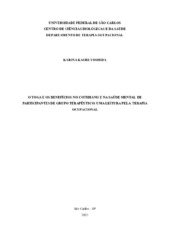Mostrar el registro sencillo del ítem
O yoga e os benefícios no cotidiano e na saúde mental de participantes de grupo terapêutico: uma leitura pela terapia ocupacional
| dc.contributor.author | Yoshida, Karina Kaori | |
| dc.date.accessioned | 2021-07-09T01:04:56Z | |
| dc.date.available | 2021-07-09T01:04:56Z | |
| dc.date.issued | 2021-06-26 | |
| dc.identifier.citation | YOSHIDA, Karina Kaori. O yoga e os benefícios no cotidiano e na saúde mental de participantes de grupo terapêutico: uma leitura pela terapia ocupacional. 2021. Trabalho de Conclusão de Curso (Graduação em Terapia Ocupacional) – Universidade Federal de São Carlos, São Carlos, 2021. Disponível em: https://repositorio.ufscar.br/handle/ufscar/14562. | * |
| dc.identifier.uri | https://repositorio.ufscar.br/handle/ufscar/14562 | |
| dc.description.abstract | Yoga is an Indian philosophical system aimed at the study of consciousness and self-knowledge. For some decades, it has been incorporated into the Public Health in Brazil, from the perspective of an integrative practice, as a strategy for promoting care and treatment. Occupational therapists are worked in with the Integrative and Complementary Practices, aiming at the construction of therapeutic projects that consider the subject's living spaces and their daily activities. The objective of this research was to analyze the benefits attributed to the practice of yoga in the mental and physical health of practitioners, from the improvement of symptoms and the performance of self-reported significant activities, correlating to the daily discussion in occupational therapy. The methodology used followed a qualitative framework, analyzing data from the research entitled “Characterization of the clientele of yoga groups in a university health service”, out of an instrument for investigating symptoms and activities and a survey of the participation in the groups; the second stage, bibliography research in academic texts and publications related to occupational therapy and daily life and the text Patañjali Yoga Sutras. The most frequently mentioned symptom was “anxiety” and the activity “study” indicated an important link to the academic environment. Most participants reported positive effects of yoga on symptoms that hindered activities that were meaningful to them in their daily lives, based on collective practices that prioritizes self-care techniques, self-knowledge and self-development, in order to balance the psycho-emotional and physical state. The study allowed articulations with the field of knowledge of occupational therapy, which in its interventions addresses the subject’s living spaces and the actions performed in daily life. | eng |
| dc.description.sponsorship | Não recebi financiamento | por |
| dc.language.iso | por | por |
| dc.publisher | Universidade Federal de São Carlos | por |
| dc.rights | Attribution-NonCommercial-NoDerivs 3.0 Brazil | * |
| dc.rights.uri | http://creativecommons.org/licenses/by-nc-nd/3.0/br/ | * |
| dc.subject | Ioga | por |
| dc.subject | Integralidade em saúde | por |
| dc.subject | Terapia Ocupacional | por |
| dc.subject | Cotidiano | por |
| dc.subject | Saúde mental | por |
| dc.subject | Yoga | eng |
| dc.subject | Integrality in health | eng |
| dc.subject | Occupational therapy | eng |
| dc.subject | Daily life | eng |
| dc.subject | Mental health | eng |
| dc.title | O yoga e os benefícios no cotidiano e na saúde mental de participantes de grupo terapêutico: uma leitura pela terapia ocupacional | por |
| dc.title.alternative | Yoga and its benefits in the daily life and mental health of a therapy group participants: a reading through the occupational therapy | eng |
| dc.type | TCC | por |
| dc.contributor.advisor1 | Furlan, Paula Giovana | |
| dc.contributor.advisor1Lattes | http://lattes.cnpq.br/3590676003159251 | por |
| dc.description.resumo | Yoga é um sistema filosófico indiano que visa o estudo da consciência e do autoconhecimento. Há algumas décadas, vem sendo incorporado no campo da saúde no Brasil, na perspectiva de uma prática integrativa, como estratégia de promoção do cuidado e do tratamento. Os terapeutas ocupacionais estão inseridos como profissionais atuantes com as Práticas Integrativas e complementares em Saúde, visando a construção de projetos terapêuticos que considerem os espaços de vida do sujeito e suas atividades realizadas no cotidiano. Este trabalho objetivou analisar os benefícios atribuídos à prática de yoga na saúde mental e física de praticantes, a partir da melhora de sintomas e no desempenho de atividades significativas auto reportadas, correlacionando à discussão de cotidiano em terapia ocupacional. A metodologia utilizada seguiu referencial qualitativo, analisando dados da pesquisa intitulada “Caracterização de clientela de grupos de yoga em serviço de saúde universitário'', oriundos de instrumento para investigação de sintomas e atividades e de questionário avaliativo de participação nos grupos; a segunda etapa, pesquisa de bibliografia em textos e publicações acadêmicas relativas à terapia ocupacional e cotidiano e o texto Yoga Sutras de Patañjali. O sintoma mencionado com mais frequência foi “ansiedade” e a atividade “estudo” apontou um importante vínculo das pessoas com o meio acadêmico. A maior parte dos participantes relatou efeitos positivos do yoga sobre os sintomas que prejudicavam atividades significativas para si em seu cotidiano, a partir de práticas coletivas que priorizassem técnicas de autocuidado, autoconhecimento e desenvolvimento de si, para equilíbrio do estado psicoemocional e físico. O estudo permitiu articulações com o campo de conhecimento da terapia ocupacional, que em suas intervenções aborda os espaços de vida do sujeito e as ações que realiza em seu cotidiano. | por |
| dc.publisher.initials | UFSCar | por |
| dc.subject.cnpq | CIENCIAS DA SAUDE::FISIOTERAPIA E TERAPIA OCUPACIONAL | por |
| dc.subject.cnpq | CIENCIAS DA SAUDE::SAUDE COLETIVA | por |
| dc.publisher.address | Câmpus São Carlos | por |
| dc.contributor.authorlattes | http://lattes.cnpq.br/7043851257568669 | por |
| dc.publisher.course | Terapia Ocupacional - TO | por |

